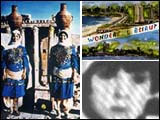Director: Catherine David, Director of Documenta X, Kassel, 1997. Since January 2002 director of Witte de With, Rotterdam.
Date: 22-26 October 2001.
Participants: Walid Sadek (Beirut), Tony Chakar (Beirut), Jalal
Toufic (Beirut), Ali Atassi (Damasco), Salah Jamal (Barcelona).
In coproduction with: Fundació Antoni Tàpies and Arteleku-Diputación Foral de Gipuzkoa.
In collaboration with: Centro Andaluz de Arte Contemporáneo.
PRESENTATION
 From the Western perspective,
the Arab world tends to be conceived as a closed, homogeneous whole in which
very different cultural realities and social situations come together. News
on its cultural proposals and practises are still very diffuse or too selective
and very often undervalued or treated by the media with condescension. From the Western perspective,
the Arab world tends to be conceived as a closed, homogeneous whole in which
very different cultural realities and social situations come together. News
on its cultural proposals and practises are still very diffuse or too selective
and very often undervalued or treated by the media with condescension.
For this reason, to discuss
contemporary Arab representations and to do so without the simplifying urgency
of media interest seems to be one of the most adequate paths to take in order
to both transcend preconceived ideas and prejudices which determine our vision
or interpretation of the Arab world and thus encourage a real dialogue between
discourses which normally reject one another.
Beirut
as laboratory
Contemporary Arab representations is the title of the seminar led by
Catherine David and which opened the activities of UNIA
art and thinking. It is the starting point of a long-term project,
whose aim is to facilitate the circulation, production and exchange between
different cultural centres in the Arab world and the rest of the planet. In
its first phase, which took place from the 22nd to the 26th October 2001 at
the Universidad Internacional de Andalucia (Seville), the situation in the
Middle East was examined, centering its attention in a specific territorial
context charged with historical significance: the city of Beirut (Lebanon).
A fragmented city and area which hosts a very conflictive and complex symbolic reality and whose
social, political and economic situation is encouraging the emergence of unheard
of experimental cultural practices in the Arab world. Cultural practices which
evade stereotypes and common areas and weave contemporary reality from a critical
perspective.
The participants who took
part in the Seville seminar live and/or work in the Lebanese capital, their
preoccupations and ethical and aesthetic proposals are unmistakably contemporary,
but without losing sight of the specific context that has generated them,
they transcend any territorial significance. Walid Sadek, Tony Chakar, Jalal
Toufic or Ali Atassi reflected on questions such as the artificial reconstruction
of the collective memory, the dizzying void of televised images, the need
to rediscover, the search for certainties in a society in ruins or the tricks
of cultural identity. Together with the cultural legacy of the Arab world,
in their interventions they included references to Marx, Godard, Benjamin,
Baudrillard, Guy Debord or Lyotard.
To escape from the patronising
and opportunistic attitude with which the works and ideas of contemporary
creators linked to the Arab world are presented, is one of the most fundamental
aims of this seminar. “What interests us - underlines Catherine David
- is the emancipating potential of their proposals, their capacity to question
from a radical and experimental perspective the social and cultural discourses
that surround them. It is not a question of valuing things from an evolutionist
western historicism which frequently leads to a sterile formalism”.
The end product is not
to create a launch pad of specific Arab artists on an international level,
but to contribute to the consolidation of a series of “emerging cultural
situations” -like those which are currently developing in Lebanon - creating
networks of international and interdisciplinary collaboration which work in
the long term with rigour and constancy. For this reason, Contemporary
Arab representations emerges as an open project, with a spirit of continuity,
in fact new work phases are constantly being prepared: a seminar in Schloss
Solitude Akademie, Stuttgart (12th - 16th February), a monograph in the Zehar
journal of Arteleku
(January 2002) and a wider project in the Fundacio Antoni Tapies, Barcelona
(2 May - 7 July 2002).
PROGRAMME
Monday, 22 October
· 18:30 h. Introduction: Catherine David.
· 19:00 - 21:00 h. Presentation: Walid Sadek.
Tuesday, 23 October
· 11:30 - 13:30 h. Work session: Walid Sadek.
· 19:00 - 21:00 h. Presentation: Tony Chakar.
Wednesday, 24 October
· 11:30 - 13:30 h. Work session: Tony Chakar.
· 19:00 - 21:00 h. Presentation: Jalal Toufic.
Thursday, 25 October
· 11:30 - 13:30 h. Work session: Jalal Toufic.
· 19:00 - 21:00 h. Presentation: Ali Atassi. Screening of the film Ibn al
Am (The Friend), 50 minutes.
Friday, 26 October
· 12:00 - 14:00 h. Presentation: Salah Jamal.
* All the evening sessions
and Friday at 12:00 h. will be open to all and simultaneous translation will
be made available.
PARTICIPANTS
Walid Sadek.
Is an artist and writer born in Beirut, Lebanon in 1966. His latest exhibitions
have been, among others, Rumours,Townhouse Gallery, Cairo, 2001; Adolescence,
Ayloul Festival 2000, Beirut and Karaoke, The Bluecoat Gallery, Liverpool,
1998. He is author of several books such as Laziness, The 3rd World,
Beirut, 1999 and Bigger than Picasso, Ayloul Festival 99, Beirut. His
presentation represents a critical assessment of developments in recent art
practices in post-war Beirut seen through the work of a number of artists.
Issues such as the co-habitation of protest and despair, the borrowing of
a will to "speech" coupled with the dear failures of "delayed
experiences" are brought to bear on the field of current art in its limitations
and possibilities.
Tony Chakar.
Born in Beirut, Lebanon in 1968. Studied architecture in the Académie
Libanaise des Beaux-Arts, and is now involved in many projects including installation
and intervention art, theater and writing. His presentation will re-examine
the city as a reservoir for the Collective Memory of its inhabitants, through
metaphors of martyrdom, amnesia, speed, guilt, architecture and the distortions
of visions imposed by ideological and political discourses.
Jalal Toufic.
Is a writer, film theorist and video artist born in Beirut, Lebanon in 1962.
Author of several books such as Over-Sensitivity, Sun&Moon, 1996
and Forthcoming, Atelos, 2000. He is currently an Associate Professor
at the Department of Visual and Performing Arts, USEK, Lebanon. About his
presentation titled "The Withdrawal of Tradition Past a Surpassing Disaster"
he says: "I have to do my best to physically preserve tradition (the
books, the films, the architectural monuments, etc.), while knowing that what
I will save from the surpassing disaster survived it and therefore, no less
than what has been destroyed, has to be resurrected -one of the limitations
of history as a discipline is that the persistence of the documents blinds
it to the exigency of the resurrection. Past a surpassing disaster tradition
withdraws, with the consequence that it can no longer be available except
through resurrection".
Ali Atassi (Syria,
1967).
Who has studied engineering, social sciences and history, has worked for some
years as a journalist and publishes regularly in the cultural supplement of
the al Nahar newspaper in Beirut. Reflecting on the situation of Lebanese
society in which he currently lives, he will base his presentation on three
points: the relationship between image and reality; the possibility of criticising
the image through the image and the impact that new artistic representations
have on society and vice versa.
Salah Jamal (Nablus,
Palestina, 1951).
Doctor, historian, writer and gastronomist is from Barcelona but of Palestinian
origin, he is also an expert in Middle Eastern affairs. With a degree and
PhD from the University of Barcelona in medicine and surgery, he now teaches
culture and nutrition at the University of Vic. His publications include Four
Impressions of Catalunya, Fundació Jaume Bofill and La Generalitat
de Catalunya, 2001, and Palestine, occupation and resistance, del Jonc,
2001. In this seminar, he will present his book Arab Aroma, stories and
recipes, Zendrera, which received a prize at the International Cookery
Book Awards, Périgueux 2000, in which he outlines cultural and anthropological
issues seen through Arab recipes.
|
 Representaciones Árabes contemporáneas
Representaciones Árabes contemporáneas  Seminar Middle East
Seminar Middle East
 From the Western perspective,
the Arab world tends to be conceived as a closed, homogeneous whole in which
very different cultural realities and social situations come together. News
on its cultural proposals and practises are still very diffuse or too selective
and very often undervalued or treated by the media with condescension.
From the Western perspective,
the Arab world tends to be conceived as a closed, homogeneous whole in which
very different cultural realities and social situations come together. News
on its cultural proposals and practises are still very diffuse or too selective
and very often undervalued or treated by the media with condescension.